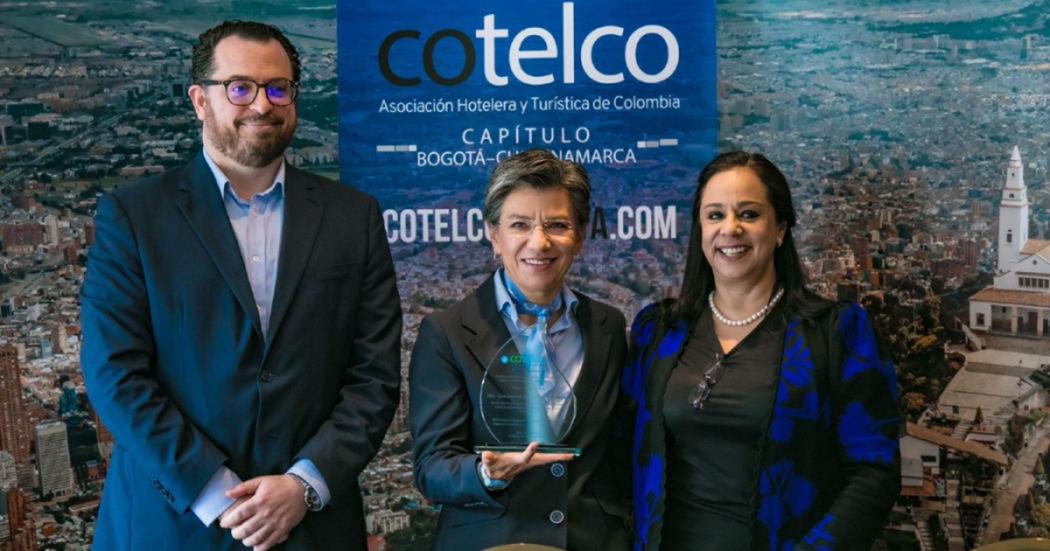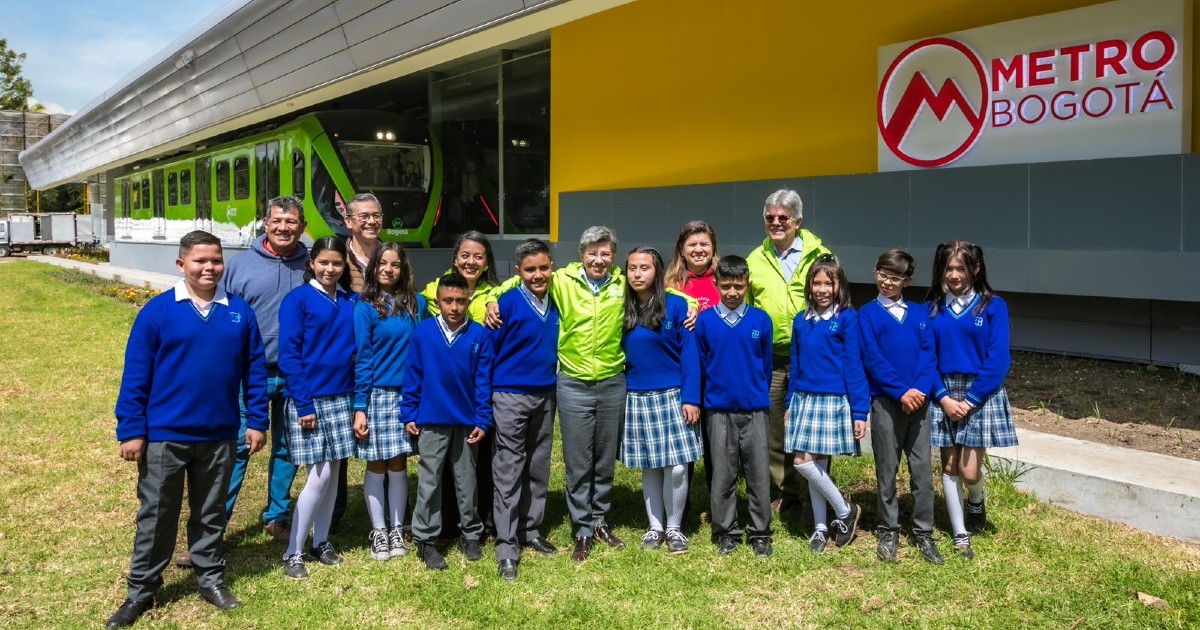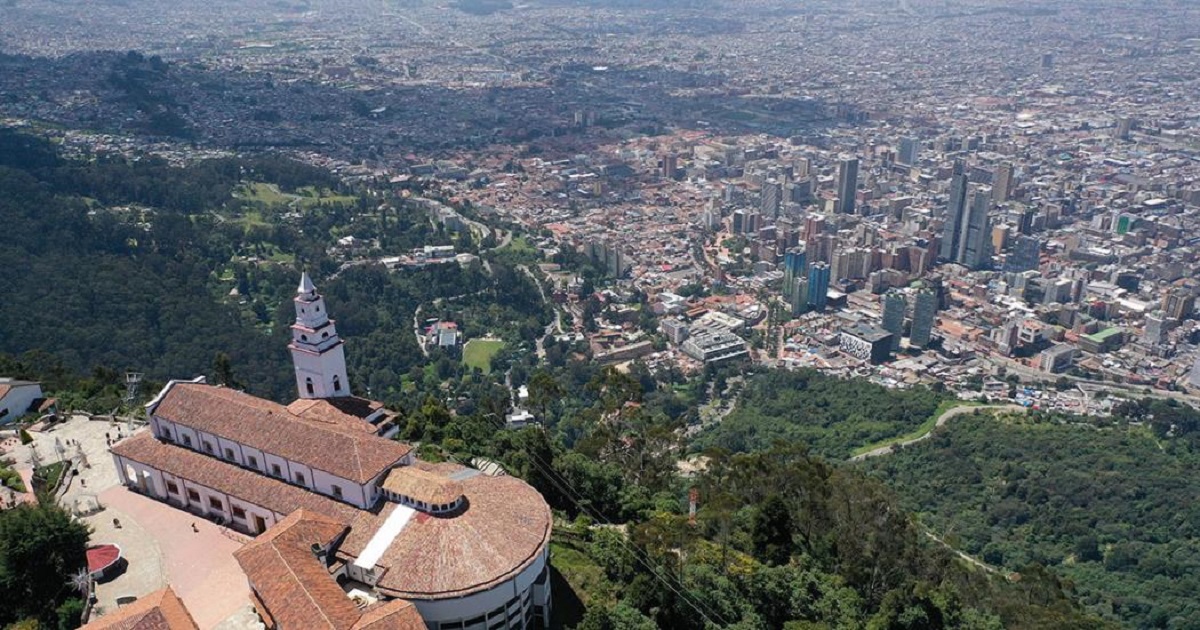Colombian Hotel and Tourism Association (Cotelco) gave a recognition to the Mayor of Bogotá, Claudia López, due to her government's support for the tourism sector of the country's capital.
"I want to acknowledge the Mayor's willingness and that of her entire team, because they were always ready, they opened their doors to us, attended us, and there was always a dialogue," stated Wolf Alexandrovich, President of the Board of Directors of Cotelco Bogotá and Cundinamarca, and Manager of the Estelar Parque de la 93 Hotel.
On the other hand, the Executive Director of Cotelco, María Patricia Guzmán Zárate, expressed gratitude to the district leader because, thanks to the post-pandemic economic recovery efforts, Bogotá now boasts a 65% hotel occupancy rate, "the highest index nationwide. I'm almost certain we'll conclude with that, and with a rate we had never achieved before. The city's hospitality industry stands here, very proud of you, of what you have accomplished, and of what your team has enabled us to achieve through collaborative work."
In this tweet, the Mayor refers to the hotel occupancy rate in Bogotá:
En reunión con @Cotelcocol, me complace contarles que hoy nuestra ciudad tiene mayor ocupación hotelera, más vuelos con turistas que vienen a visitarnos y más empresas en el sector del turismo que en 2019.
— Claudia López Hernández (@ClaudiaLopez) August 22, 2023
Salimos fortalecidos de la pandemia gracias a las heroínas y héroes del… pic.twitter.com/is29iKxlgD
Throughout this Administration, there was a collaborative effort between the Mayor's Office of Bogotá and Cotelco, which solidified the city as Colombia's primary tourist destination. According to data from the first half of 2023, hotel occupancy surpassed pre-pandemic figures, reaching 65.32% between January and June of this year, compared to 60.41% during the same period in 2019.
"Thank you all so much for this recognition, and how joyful it is to find ourselves in better circumstances. I remember our first meeting in 2020, right in the midst of the pandemic and in a very challenging situation for this sector. We set out to accomplish many things together, things that were feasible and realistic, and everything we aimed for, we achieved," exclaimed Mayor Claudia López, filled with emotion.
During her speech, the Mayor highlighted, for instance, that this coordinated effort positioned Bogotá as a city that welcomes both national and international tourist visitors. For instance, between January and May 2023, 676,963 foreign visitors arrived, marking a 22% increase compared to the same period in 2019, when the number was 555,090, according to figures from Migración Colombia (Colombian Migration Office).
It's worth noting that tourism has become a tool that contributes to the growth of the city's economic and productive indicators, as it generates development, employment, and well-being for thousands of families. Another notable figure is the 23,574 international flights that arrived in Bogotá between January and June of this year, a 2.3% increase compared to the same period in 2019 when there were 23,039 landings, according to data from the Civil Aviation Authority (Aerocivil).
Adding to these statistics is the fact that in February of this year, the city doubled the number of Registered Tourism Service Providers (RNT) it had in 2019. In other words, Bogotá went from 5,104 in 2019 to 10,231 in 2023, according to figures from the Chamber of Commerce of Bogotá.
Now, the positive outcomes of this collaborative effort pave the way for future progress, aiming to solidify the hotel and tourism sectors as pivotal drivers of investment, employment, and development for the city.
Mayor López affirmed that "Biciregión" is one of the city's significant icons that should be leveraged in the tourism sector. "We are the global capital of bicycles; there's no other city in the global south with 700 kilometers of bicicle paths. That's Bogotá's distinction, and in 10 years, it won't be 700 kilometers, but 1,000 kilometers, interconnected with the region. That's a distinctive icon," she added.
The Bogotá leader mentioned that the work is ongoing and the promotion of Bogotá as a destination will be further strengthened in collaboration with the business sector. This will involve a series of marketing campaigns across various platforms, media outlets, and dissemination networks. The goal is to enhance visibility and attract new travelers.
Likewise, as the demand for travel and tourism rebounds, more jobs will be generated in the accommodation and tourism sector. This helps alleviate unemployment and revitalizes local communities. Similarly, the promotion of local commerce will be bolstered to contribute to the development of new ventures and drive the informal economy, while fostering the growth of new enterprises and boosting the local economy.
Bogotá´s Tourism Public Policy
During the event, the Mayor emphasized that Bogotá has a lot to offer in terms of tourism. One of the most significant initiatives that the city Administration pursued through the Bogotá Institute of Tourism (IDT) was the city´s Tourism Public Policy. This initiative, approved by CONPES last March, was developed in collaboration with the community between 2021 and 2022.
Main objectives of this Public Policy:
• Enhance the governance of the city Tourism System
• Create optimal conditions of accessibility and inclusion for tourism development in the city
• Encourage innovation in the tourism industry
• Strengthen the implementation of sustainability in tourism
• Reinforce processes of technological innovation for optimizing tourist services in the Bogotá-Region
It's important to mention that up to the present date, the IDT has conducted a process of outreach in 18 localities in Bogotá and six city appropriation tours.
Bogotá: A Smart Tourism Destination
This year, the city received the accreditation of Smart Tourism Destination (STD), granted by the Spanish State Society for the Management of Information and Tourism Technologies (Segittur). This distinction was achieved because the administration led by Mayor Claudia López brought together over 90 public and private stakeholders, trained more than 1,200 students and entrepreneurs, and established the first Accessible Tourism Network and Colombia's first Tourism Quality System.








